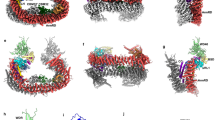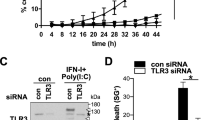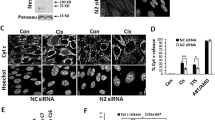Abstract
Programmed cell death is a crucial process in the normal development and physiology of metazoans, and it can be divided into several categories that include type I death (apoptosis) and type II death (autophagic cell death). The Bcl-2 family proteins are well-characterized regulators of apoptosis, among which multidomain pro-apoptotic members (such as Bax and Bak) function as a mitochondrial gateway at which various apoptotic signals converge. Although embryonic fibroblasts from Bax/Bak double-knockout (DKO) mice are resistant to apoptosis, we have previously reported that these cells still die by autophagy in response to various death stimuli. In this study, we found that jun N-terminal kinase (JNK) was activated in etoposide- and staurosporine-treated, but not serum-starved, Bax/Bak DKO cells, and that autophagic cell death was suppressed by the addition of a JNK inhibitor and by a dominant-negative mutant of JNK. Studies with sek1−/−mkk7−/− cells revealed that disruption of JNK prevented the induction of autophagic cell death. Co-activation of JNK and autophagy induced autophagic cell death. Activation of JNK occurred downstream of the induction of autophagy, and was dependent on the autophagic process. These results indicate that JNK activation is crucial for the autophagic death of Bax/Bak DKO cells.
This is a preview of subscription content, access via your institution
Access options
Subscribe to this journal
Receive 50 print issues and online access
$259.00 per year
only $5.18 per issue
Buy this article
- Purchase on Springer Link
- Instant access to full article PDF
Prices may be subject to local taxes which are calculated during checkout








Similar content being viewed by others
References
Baehrecke EH . (2002). How death shapes life during development. Nat Rev Mol Cell Biol 3: 779–787.
Behrens A, Sibilia M, Wagner FF . (1999). Amino-terminal phosphorylation of c-Jun regulates stress-induced apoptosis and cellular proliferation. Nat Genet 21: 326–329.
Boya P, Gonzalez-Polo RA, Casares N, Perfettini JL, Dessen P, Larochette N et al. (2005). Inhibition of macroautophagy triggers apoptosis. Mol Cell Biol 25: 1025–1040.
Cheng Y, Qiu F, Tashiro S, Onodera S, Ikejima T . (2008). ERK and JNK mediate TNFalpha-induced p53 activation in apoptotic and autophagic L929 cell death. Biochem Biophys Res Commun 376: 483–488.
Clarke PG . (1990). Developmental cell death: morphological diversity and multiple mechanisms. Anat Embryol (Berl) 181: 195–213.
Davis RJ . (2000). Signal transduction by the JNK group of MAP kinases. Cell 103: 239–252.
Gupta S, Campbell D, Derijard B, Davis RJ . (1995). Transcription factor ATF2 regulation by the JNK signal transduction pathway. Science 267: 389–393.
Harris CA, Johnson Jr EM . (2001). BH3-only Bcl-2 family members are coordinately regulated by the JNK pathway and require Bax to induce apoptosis in neurons. J Biol Chem 276: 37754–37760.
Ito T, Deng X, Carr B, May WS . (1997). Bcl-2 phosphorylation required for anti-apoptosis function. J Biol Chem 272: 11671–11673.
Kabeya Y, Mizushima N, Ueno T, Yamamoto A, Kirisako T, Noda T et al. (2000). LC3, a mammalian homologue of yeast Apg8p, is localized in autophagosome membranes after processing. EMBO J 19: 5720–5728.
Kim BJ, Ryu SW, Song BJ . (2006). JNK- and p38 kinase-mediated phosphorylation of Bax leads to its activation and mitochondrial translocation and to apoptosis of human hepatoma HepG2 cells. J Biol Chem 281: 21256–21265.
Klinonsky DJ . (2005). Autophagy. Curr Biol 15: R282–R283.
Kuma A, Hatano M, Matsui M, Yamamoto A, Nakaya H, Yoshimori T et al. (2004). The role of autophagy during the early neonatal starvation period. Nature 432: 1032–1036.
Levine B, Yuan J . (2005). Autophagy in cell death: an innocent convict? J Clin Invest 115: 2679–2688.
Li DD, Wang LL, Deng R, Tang J, Shen Y, Guo JF et al. (2009). The pivotal role of c-Jun NH2-terminal kinase-mediated Beclin 1 expression during anticancer agents-induced autophagy in cancer cells. Oncogene 28: 886–898.
Mizushima N, Ohsumi Y, Yoshimiri T . (2002). Autophagosome formation in mammalian cells. Cell Struct Funct 6: 421–429.
Nakano H, Nakajima A, Sakon-Komazawa S, Piao JH, Xue X, Okumura K . (2006). Reactive oxygen species mediate crosstalk between NF-kappaB and JNK. Cell Death Differ 5: 730–737.
Nishitai G, Shimizu N, Negishi T, Kishimoto H, Nakagawa K, Kitagawa D et al. (2004). Stress induces mitochondria-mediated apoptosis independent of SAPK/JNK activation in embryonic stem cells. J Biol Chem 279: 1621–1626.
Ohsumi Y . (2001). Molecular dissection of autophagy: two ubiquitin-like systems. Nat Rev Mol Cell Biol 2: 211–216.
Park J, Kim I, Oh YJ, Lee K, Han PL, Choi EJ . (1997). Activation of c-Jun N-terminal kinase antagonizes an anti-apoptotic action of Bcl-2. J Biol Chem 272: 16725–16728.
Shimizu S, Eguchi Y, Kamiike W, Matsuda H, Tsujimoto Y . (1996). Bcl-2 expression prevents activation of the ICE protease cascade. Oncogene 12: 2251–2257.
Shimizu S, Kaneseki T, Mizushima N, Mizuta K, Arakawa-Kobayashi S, Thompson CB et al. (2004). Role of Bcl-2 family proteins in a non-apoptotic programmed cell death dependent on autophagy genes. Nat Cell Biol 6: 1221–1228.
Tournier C, Hess P, Yang DD, Xu J, Turner TK, Nimnual A et al. (2000). Requirement of JNK for stress-induced activation of the cytochrome c-mediated death pathway. Science 88: 870–874.
Tsuruta F, Sunayama J, Mori Y, Hattori S, Shimizu S, Tsujimoto Y et al. (2004). JNK promotes Bax translocation to mitochondria through phosphorylation of 14-3-3 proteins. EMBO J 23: 1889–1899.
Ventura JJ, Hubner A, Zhang C, Flavell RA, Shokat KM, Davis RJ . (2006). Chemical genetic analysis of the time course of signal transduction by JNK. Mol Cell 21: 701–710.
Yu L, Alva A, Su H, Dutt P, Freundt E, Welsh S et al. (2004). Regulation of an ATG7-beclin 1 program of autophagic cell death by caspase-8. Science 304: 1500–1502.
Yu L, Wan F, Dutta S, Welsh S, Liu Z, Freundt E et al. (2006). Autophagic programmed cell death by selective catalase degradation. Proc Natl Acad Sci USA 103: 4952–4957.
Wei Y, Pattingre S, Sinha S, Bassik M, Levine B . (2008). JNK1-mediated phosphorylation of Bcl-2 regulates starvation-induced autophagy. Mol Cell 30: 678–688.
Acknowledgements
We thank Dr N Mizushima for providing us with MEFs from Atg5−/− and Atg5+/+ mice and pCAGGS-GFP-LC3 plasmid. We also thank Drs R Davis and Y Gotoh for providing PCMV5-JNK1 APF plasmid and pCDNA3 MKK7-JNK1 WT plasmid, respectively. This study was partly supported by the Program for Promotion of Fundamental Studies in Health Sciences of the National Institute of Biomedical Innovation (NIBIO); a grant for Scientific Research on Priority Areas, SORST of Japan Science and Technology Corp; a grant for the 21st Century COE Program; a grant for Creative Scientific Research from the Japanese Ministry of Education, Science, Sports and Culture; and a grant for Comprehensive Research on Aging and Health from the Japanese Ministry of Health, Labor and Welfare. This study was also supported by grants from the Uehara Memorial Foundation and the Naito Foundation.
Author information
Authors and Affiliations
Corresponding authors
Rights and permissions
About this article
Cite this article
Shimizu, S., Konishi, A., Nishida, Y. et al. Involvement of JNK in the regulation of autophagic cell death. Oncogene 29, 2070–2082 (2010). https://doi.org/10.1038/onc.2009.487
Received:
Revised:
Accepted:
Published:
Issue Date:
DOI: https://doi.org/10.1038/onc.2009.487
Keywords
This article is cited by
-
CHI3L1 induces autophagy through the JNK pathway in lung cancer cells
Scientific Reports (2023)
-
Friend or foe: role of pathological tau in neuronal death
Molecular Psychiatry (2023)
-
Association between the antioxidant properties of SESN proteins and anti-cancer therapies
Amino Acids (2023)
-
PGK1 represses autophagy-mediated cell death to promote the proliferation of liver cancer cells by phosphorylating PRAS40
Cell Death & Disease (2022)
-
Increased CSF-decorin predicts brain pathological changes driven by Alzheimer’s Aβ amyloidosis
Acta Neuropathologica Communications (2022)



